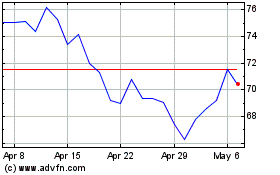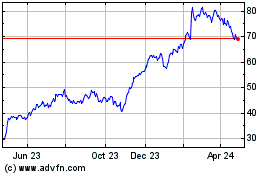By Preetika Rana
SAN FRANCISCO -- The biggest ride-sharing and food-delivery
companies in the U.S. are in talks to set up a fund to compensate
drivers affected by the novel coronavirus, a step that highlights
the pressure they face to provide workers with broader employment
protections.
Uber Technologies Inc., Lyft Inc., DoorDash Inc., Postmates Inc.
and Instacart Inc. are involved in the discussions and are weighing
how to band together for potential payments, according to people
familiar with the matter. The San Francisco-based companies are
looking at paying workers in the U.S. who have been infected or
quarantined by a public health agency. They continue to negotiate
on details for a potential fund and are expected to make a decision
in the coming days, the people said.
Some drivers say compensation that is only available after a
diagnosis or quarantine may not be enough. As independent
contractors, most don't receive paid time off, which would allow
them to stop working if they were to experience any symptoms.
Lawmakers and labor groups have begun to focus on that issue as a
public health risk.
"If I don't drive, I can't pay my rent, I can't pay for child
support," said Steve Gregg, a 51-year-old father of three who
drives full-time for Uber in San Francisco. "If you're only going
to compensate us after we're quarantined, it's already too late,"
he said.
An Uber driver in New York tested positive for the virus, a
company spokesman said Saturday. The spokesman added that
infections had not spread between drivers and riders "to the best
of our knowledge."
On Friday, Sen. Mark Warner (D, Va.) wrote to the chief
executives of U.S. ride-sharing and food-delivery companies,
calling on them to ensure "that economic uncertainty will not be
deterrents to their workers following public health guidance."
The scramble to provide compensation is set to thrust labor
policies into the limelight for companies that rely on a pool of
workers they say are independent contractors. Uber, Lyft, DoorDash,
Postmates and Instacart are fighting a California law that seeks to
force them to classify drivers as employees who are eligible for
benefits such as paid sick leave and health insurance.
The companies have argued that the law, which took effect Jan.
1, doesn't require them to reclassify their drivers as employees.
Some state legislators have insisted that it does. The companies
have collectively raised over $110 million for a state ballot
initiative this year that asks voters to exempt them from the
statute. The ballot measure promises other guarantees if approved,
such as health-care subsidies for drivers who work 15 hours or more
a week. New York is also considering legislation aimed at offering
better protections to gig workers.
Through primary or secondary jobs, over a third of U.S. workers
participate in what is often called the "gig economy," a labor
market defined by short-term, independent and nontraditional
working relationships, a 2018 Gallup study found. Gig workers are
typically not employees, and therefore not entitled to traditional
benefits, though new laws and court cases against companies in the
U.S. and overseas are seeking to change that.
Late Friday, Uber said it would compensate drivers diagnosed or
quarantined by a public health authority with up to 14 days of
missed pay. The company didn't say how pay would be calculated. So
far, the ride-sharing company has compensated five drivers in the
U.K. and Mexico, according to a person familiar with the issue. The
drivers were quarantined but didn't test positive, this person
said.
A Lyft spokeswoman said the company had also decided to provide
funds to drivers infected or quarantined by a public health
authority. She didn't elaborate.
Drivers say they face a conundrum: lose pay staying at home or
risk exposure as demand for private taxis and grocery-deliveries
surges.
"Uber every day sends a message saying if you are sick, take a
holiday and rest," said Rakesh Roshan, a 27-year-old Uber driver in
New York. But staying home won't pay the bills, he says.
Mr. Roshan says he cleans his car more often than usual, but
doesn't have any face masks nor has he had many passengers wearing
them.
An online petition urging Uber, Lyft, DoorDash and others to
provide drivers paid leave had hundreds of signatures on Saturday,
hours after it was created by Gig Workers Rising, a group for
app-based drivers.
In private Facebook groups for Uber and Lyft drivers in the
U.S., members say they are worried about being on the front lines.
One driver said she found the virus "terrifying" and didn't feel
safe having people in her car. Others exchanged suggestions, such
as wiping down door handles and seats or offering hand sanitizer to
passengers.
Kelly Flaherty, who drives for Lyft in San Francisco, placed a
package of Wet Wipes on his center console during a ride Saturday
afternoon, though he said passengers had yet to take one.
Drivers say the companies have done little besides offering
guidance such as asking them to wash their hands more
frequently.
Postmates is considering supporting health checks-ups for
drivers, according to a person involved in those discussions.
Postmates and Instacart also allowed delivery drop-offs this week,
to limit contact between customers and drivers.
Instacart's sales growth accelerated 10-fold in the seven days
through Wednesday compared with the previous seven days, as people
stockpiled food and other items, the company said. Meanwhile, Lyft
Chief Financial Officer Brian Roberts said the company set a record
on rides and revenue last week as people ditched public transport
for private taxis.
"When you're packed against people and you hear distant
coughing, I think there's nothing worse in terms of the human
psyche right now because there's just so much fear," Mr. Roberts
said at a conference earlier this week.
--Dana Mattioli, Rolfe Winkler and Sarah Needleman contributed
to this article.
Write to Preetika Rana at preetika.rana@wsj.com
(END) Dow Jones Newswires
March 08, 2020 08:35 ET (12:35 GMT)
Copyright (c) 2020 Dow Jones & Company, Inc.
Uber Technologies (NYSE:UBER)
Historical Stock Chart
From Mar 2024 to Apr 2024

Uber Technologies (NYSE:UBER)
Historical Stock Chart
From Apr 2023 to Apr 2024
